
Car rental services provider Avis (NASDAQ:CAR) fell short of the market’s revenue expectations in Q3 CY2024, with sales falling 2.4% year on year to $3.48 billion. Its GAAP profit of $6.65 per share was also 21.4% below analysts’ consensus estimates.
Is now the time to buy Avis Budget Group? Find out by accessing our full research report, it’s free.
Avis Budget Group (CAR) Q3 CY2024 Highlights:
- Revenue: $3.48 billion vs analyst estimates of $3.53 billion (1.5% miss)
- EPS: $6.65 vs analyst expectations of $8.46 (21.4% miss)
- EBITDA: $503 million vs analyst estimates of $534.3 million (5.9% miss)
- Gross Margin (GAAP): 54.7%, up from 43.5% in the same quarter last year
- Operating Margin: 44.2%, up from 23.7% in the same quarter last year
- EBITDA Margin: 14.5%, down from 25.4% in the same quarter last year
- Free Cash Flow was -$2.54 billion, down from $523 million in the same quarter last year
- Market Capitalization: $3.06 billion
“We maintained a strong focus on pricing throughout the quarter, prioritizing higher margin business which allowed us to keep our revenue per day stable with the Americas nearly flat,” said Joe Ferraro, Avis Budget Group Chief Executive Officer.
Company Overview
The parent company of brands such as Zipcar and Budget Truck Rental, Avis (NASDAQ:CAR) is a provider of car rental and mobility solutions.
Ground Transportation
The growth of e-commerce and global trade continues to drive demand for shipping services, especially last-mile delivery, presenting opportunities for ground transportation companies. The industry continues to invest in data, analytics, and autonomous fleets to optimize efficiency and find the most cost-effective routes. Despite the essential services this industry provides, ground transportation companies are still at the whim of economic cycles. Consumer spending, for example, can greatly impact the demand for these companies’ offerings while fuel costs can influence profit margins.
Sales Growth
Reviewing a company’s long-term performance can reveal insights into its business quality. Any business can have short-term success, but a top-tier one sustains growth for years. Unfortunately, Avis Budget Group’s 5.5% annualized revenue growth over the last five years was tepid. This shows it failed to expand in any major way, a rough starting point for our analysis.
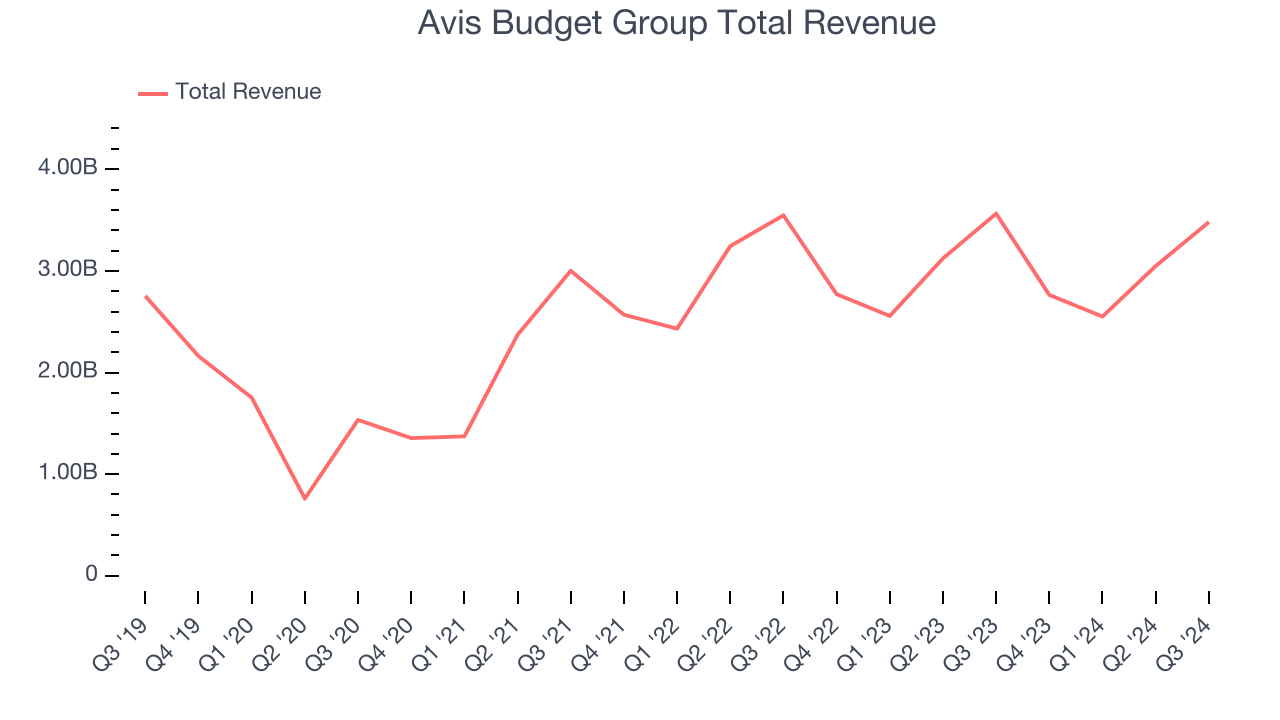
Long-term growth is the most important, but within industrials, a half-decade historical view may miss new industry trends or demand cycles. Avis Budget Group’s recent history shows its demand slowed as its revenue was flat over the last two years. We also note many other Ground Transportation businesses have faced declining sales because of cyclical headwinds. While Avis Budget Group’s growth wasn’t the best, it did perform better than its peers. 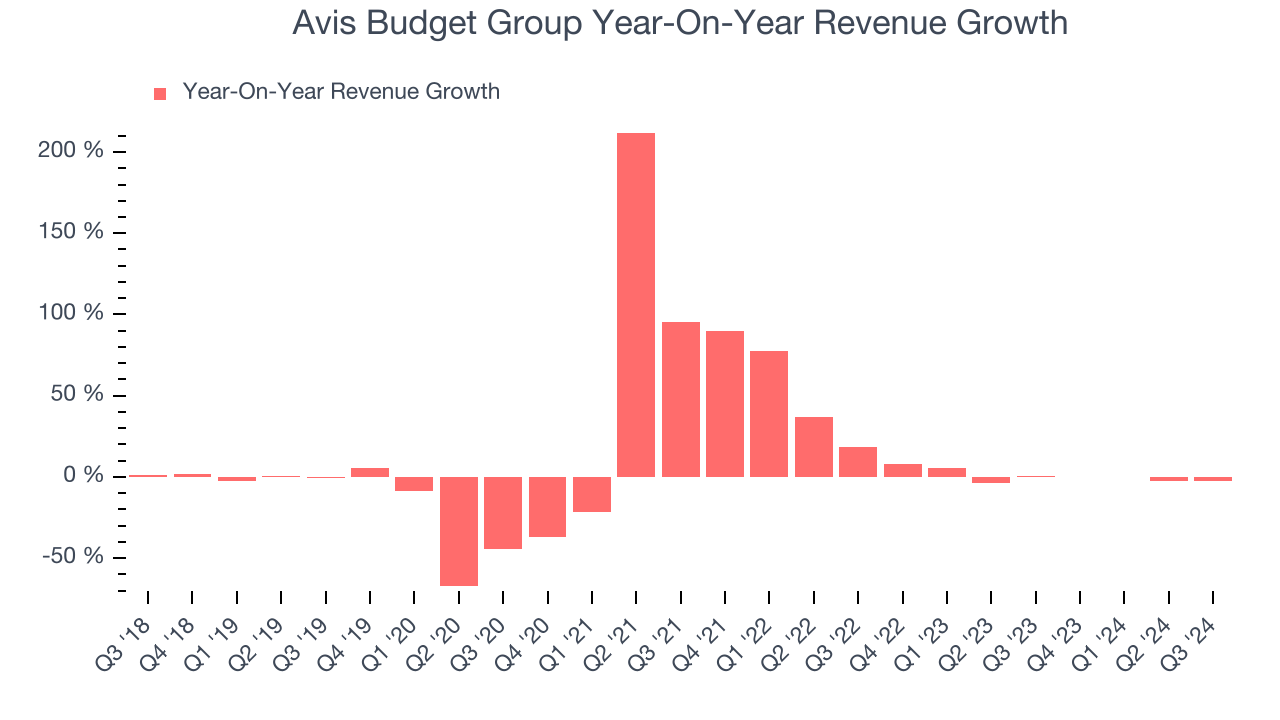
This quarter, Avis Budget Group missed Wall Street’s estimates and reported a rather uninspiring 2.4% year-on-year revenue decline, generating $3.48 billion of revenue.
We also like to judge companies based on their projected revenue growth, but not enough Wall Street analysts cover the company for it to have reliable consensus estimates.
Today’s young investors won’t have read the timeless lessons in Gorilla Game: Picking Winners In High Technology because it was written more than 20 years ago when Microsoft and Apple were first establishing their supremacy. But if we apply the same principles, then enterprise software stocks leveraging their own generative AI capabilities may well be the Gorillas of the future. So, in that spirit, we are excited to present our Special Free Report on a profitable, fast-growing enterprise software stock that is already riding the automation wave and looking to catch the generative AI next.
Operating Margin
Operating margin is one of the best measures of profitability because it tells us how much money a company takes home after procuring and manufacturing its products, marketing and selling them, and, most importantly, keeping them relevant through research and development.
Avis Budget Group has been a well-oiled machine over the last five years. It demonstrated elite profitability for an industrials business, boasting an average operating margin of 18.7%. This result isn’t surprising as its high gross margin gives it a favorable starting point.
Looking at the trend in its profitability, Avis Budget Group’s annual operating margin rose by 23.5 percentage points over the last five years, showing its efficiency has meaningfully improved.
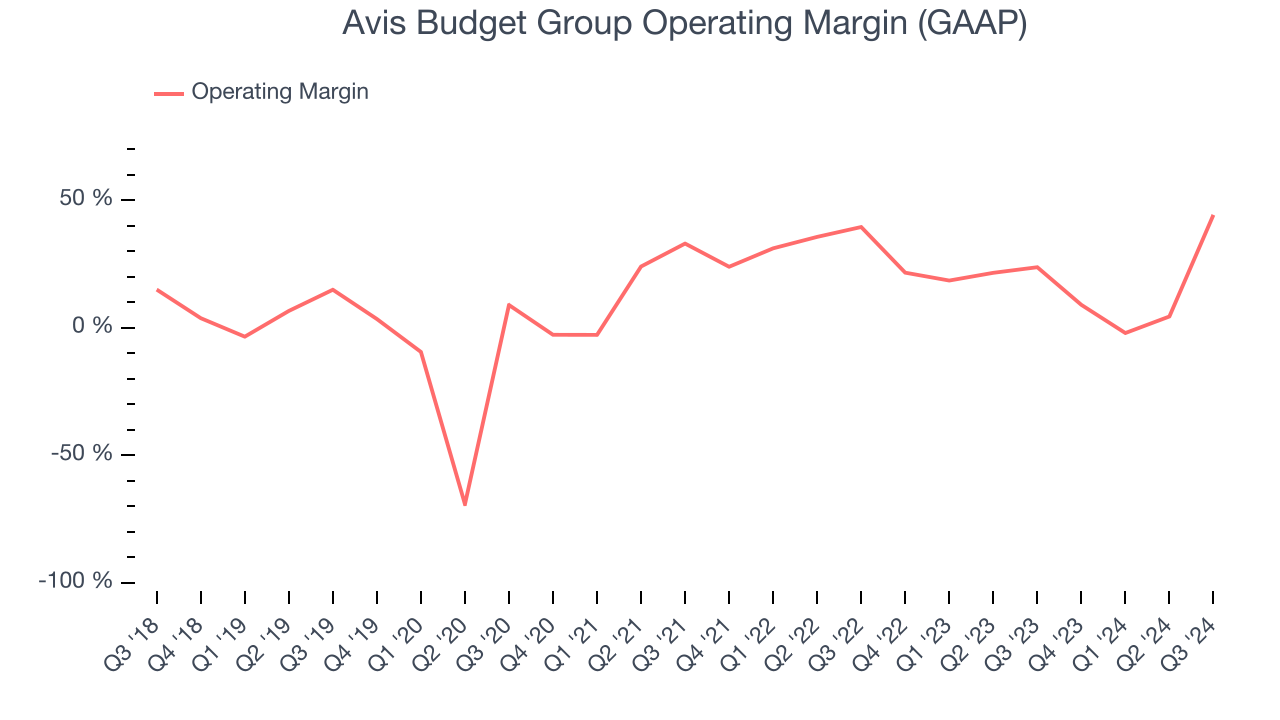
This quarter, Avis Budget Group generated an operating profit margin of 44.2%, up 20.5 percentage points year on year. The increase was solid, and since its operating margin rose more than its gross margin, we can infer it was recently more efficient with expenses such as marketing, R&D, and administrative overhead.
Earnings Per Share
Analyzing revenue trends tells us about a company’s historical growth, but the long-term change in its earnings per share (EPS) points to the profitability of that growth – for example, a company could inflate its sales through excessive spending on advertising and promotions.
Avis Budget Group’s EPS grew at an astounding 37.1% compounded annual growth rate over the last five years, higher than its 5.5% annualized revenue growth. This tells us the company became more profitable as it expanded.
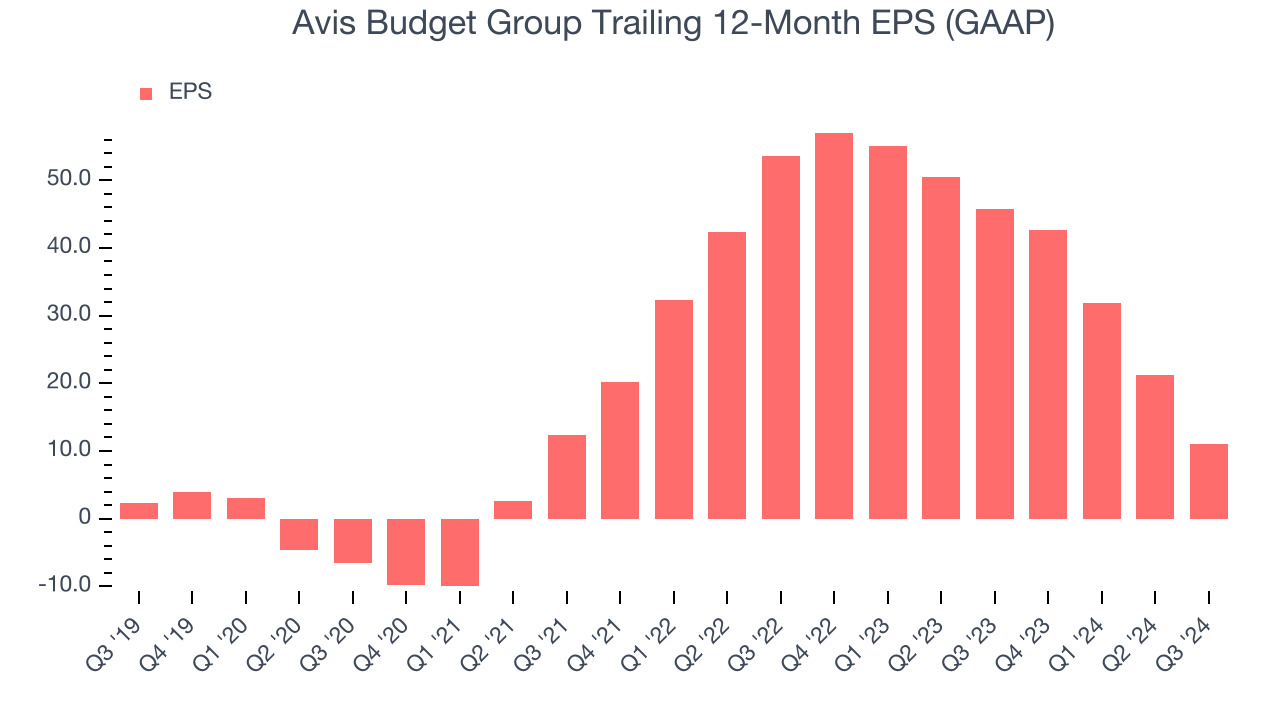
We can take a deeper look into Avis Budget Group’s earnings quality to better understand the drivers of its performance. As we mentioned earlier, Avis Budget Group’s operating margin expanded by 23.5 percentage points over the last five years. On top of that, its share count shrank by 52.8%. These are positive signs for shareholders because improving profitability and share buybacks turbocharge EPS growth relative to revenue growth. 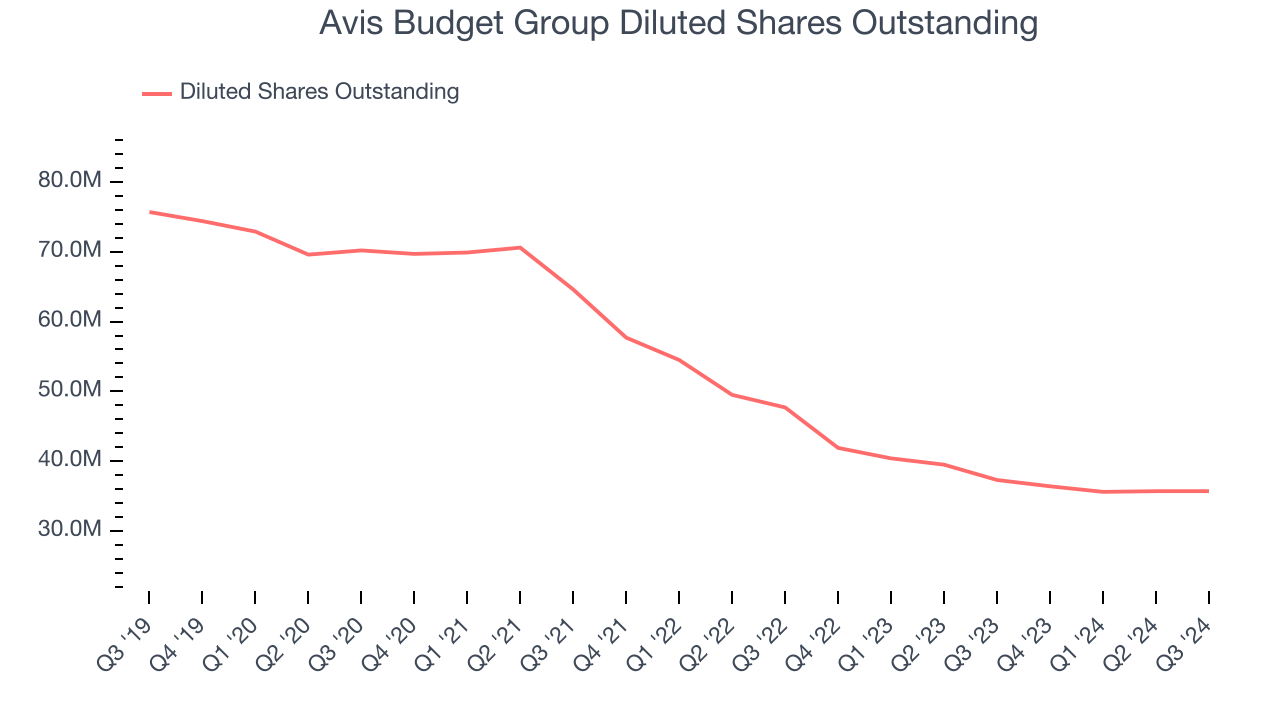
Like with revenue, we analyze EPS over a more recent period because it can give insight into an emerging theme or development for the business.
For Avis Budget Group, its two-year annual EPS declines of 54.6% mark a reversal from its (seemingly) healthy five-year trend. We hope Avis Budget Group can return to earnings growth in the future.In Q3, Avis Budget Group reported EPS at $6.65, down from $16.81 in the same quarter last year. This print missed analysts’ estimates, but we care more about long-term EPS growth than short-term movements. Over the next 12 months, Wall Street expects Avis Budget Group’s full-year EPS of $11.04 to grow by 39.8%.
Key Takeaways from Avis Budget Group’s Q3 Results
We struggled to find many strong positives in these results as its revenue, EBITDA, and EPS missed Wall Street’s estimates. Overall, this was a weaker quarter. The stock traded down 3.7% to $79.88 immediately after reporting.
Avis Budget Group underperformed this quarter, but does that create an opportunity to invest right now? We think that the latest quarter is only one piece of the longer-term business quality puzzle. Quality, when combined with valuation, can help determine if the stock is a buy. We cover that in our actionable full research report which you can read here, it’s free.
